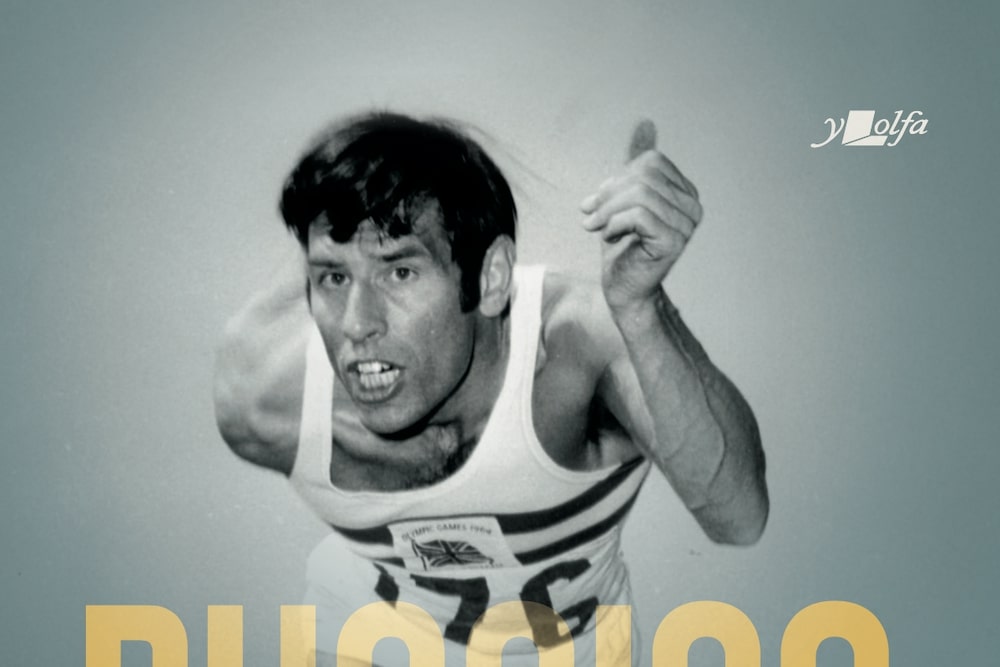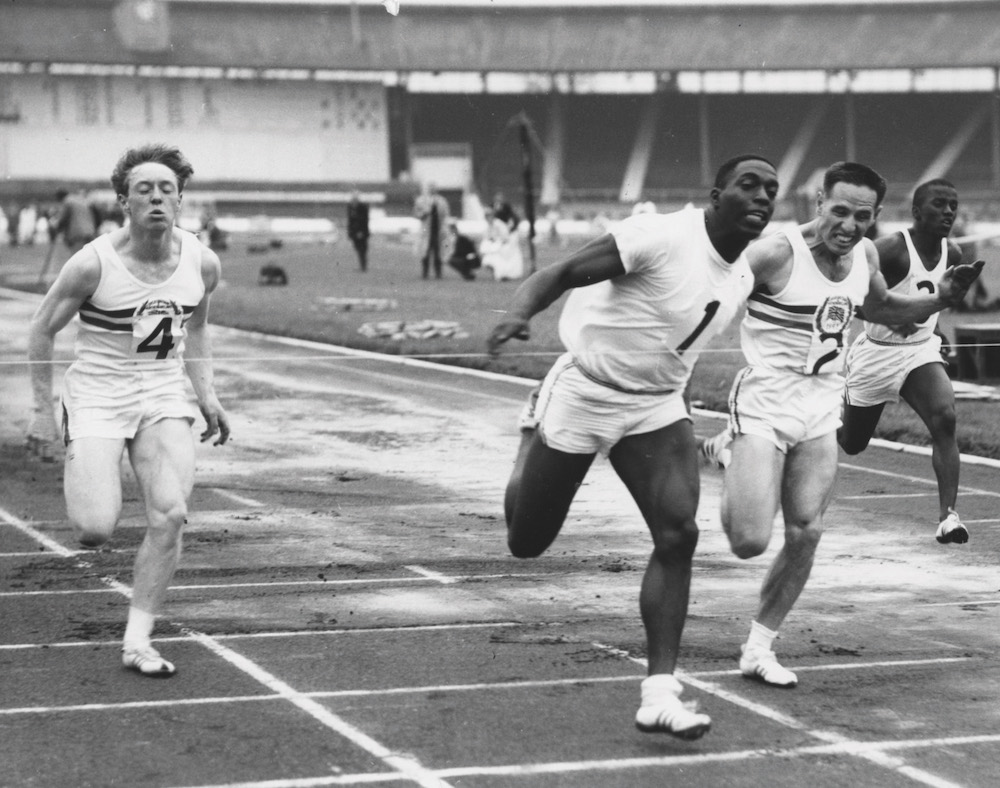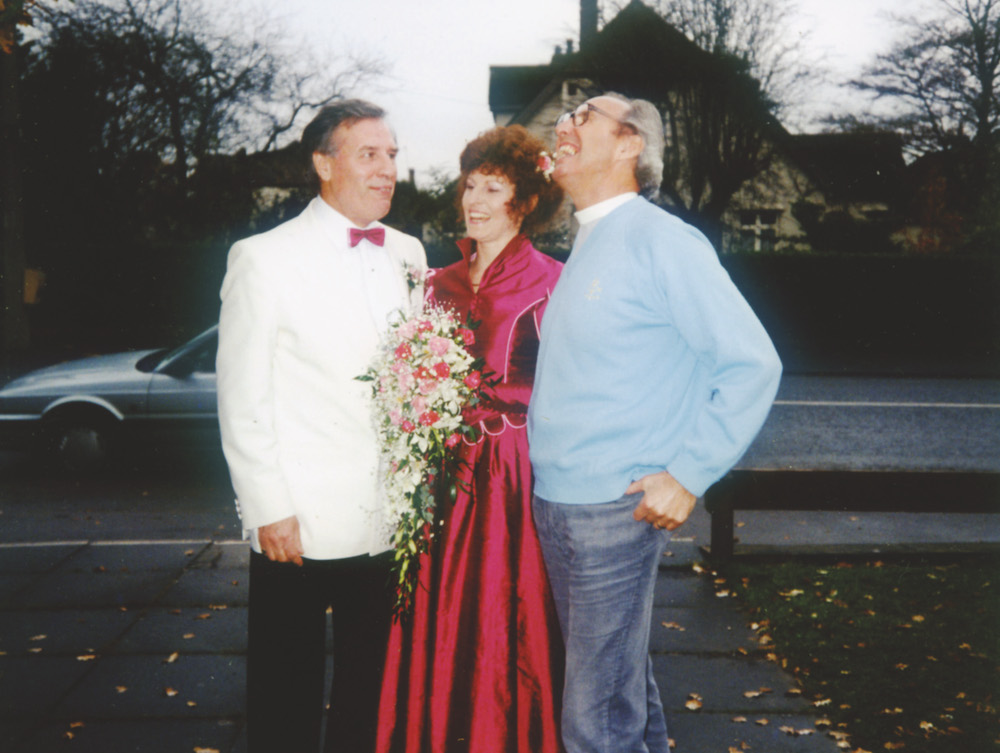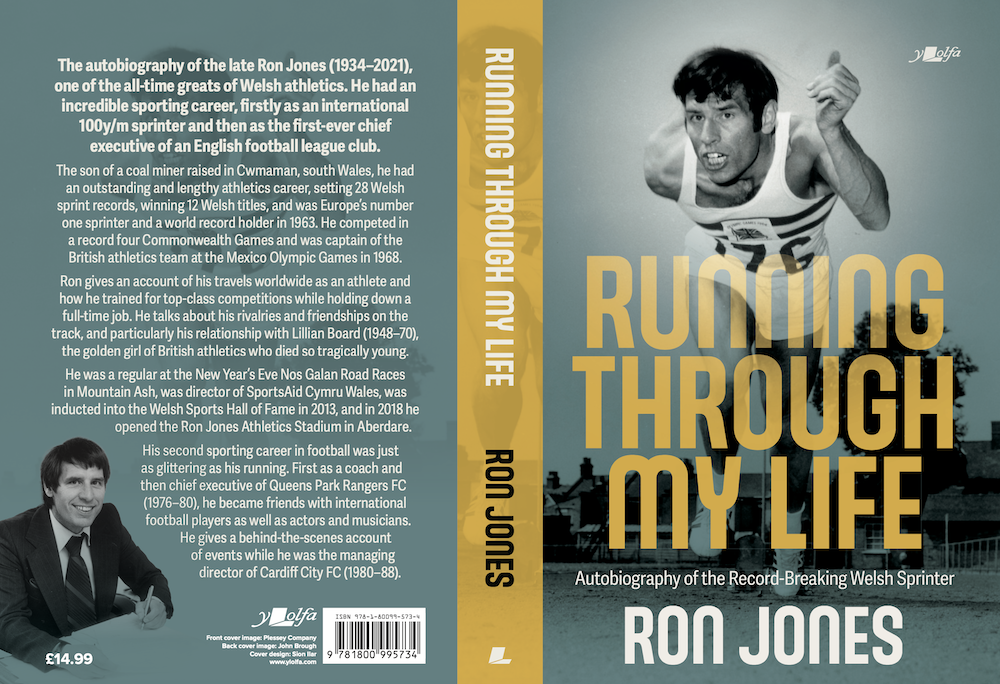Ron Jones: The incredible life of a Welsh athletics great

Linda Chamberlain-Jones
There is much said these days about the influence of social media on the minds of young people; during my childhood television had the greatest impact but for Ron, growing up in the 1930’s and 40’s, it was comics.
He had two comic book heroes, one was the character in the Wizard named Wilson who ran in the Olympic Games and had ambitions to lift a large heavy stone, and the other was Alf Tupper ‘The Tuff of the Track’, a character in the Rover.
Alf was working class, he trained running up and down mountains and was always the underdog running against upper-class university competitors. Much of Alf’s story became Ron’s story.
These fictional characters, and Ron’s real-life hero, Ken Jones (Olympic 100 metre silver medallist at the 1948 games and one of the all-time rugby greats) inspired him to become an athlete.
The son of a coal miner, Ron grew up in Cwmaman, a small village in the Aberdare valley. His home was surrounded by hills and he liked to run everywhere (often to get away from the mayhem he had created!)

He first realised he was faster than most of his peers in the Sports Day events at Aberdare Grammar and then in the Glamorganshire Schools Championships. If he was beaten in the 100, 220 and 440yard sprint events, which were run on grass, it was usually because the winner was wearing spikes and Ron was running in daps (he did not have the money to buy a pair of spikes).
After his school days, he further developed his running while doing his National Service in the RAF in Germany where he was particularly successful in the 440y event.
When he returned to civilian life in Aberdare, he was determined to continue his training and compete at the earliest opportunity.
The biggest drawback to his progress was the lack of facilities. There was no local athletics club and critically, no running track.
After being told that he would not be eligible to enter championship events unless he was a member of an athletics club, he went to Cardiff and joined Birchgrove Harriers (now part of Cardiff Athletics).
The club was based at Maindy Stadium which meant he could train on the stadium’s cinder running track but he could only afford to make the journey by bus once a week.
For the next five years most of his training was done on bumpy grass fields and a railway siding.

Despite the challenges he faced, his determination to succeed in athletics did not waiver and his break-through moment came in 1956 when he ran in the Welsh Championships and, to everyone’s surprise, including his own, he became the Welsh 100 yard sprint champion.
Up to this point he had been convinced that he was most likely to succeed in the 440y but he never competed at this distance again and focused his efforts instead on the 100y sprint and occasionally the 220y.
From this time, through to 1970, he won twelve Welsh 100y/m titles, set 28 Welsh sprint records, became the number one sprinter in Europe and along with his three GB team-mates, was a world record holder in the 4 x 110 yards relay.
He competed for Wales in a record four Commonwealth Games, made twenty-six appearances for Great Britain and Northern Ireland in major international matches, competed in three European Championships and two Olympic Games, crowning his GB representation as captain of the British athletics team at the Mexico City Olympics in 1968.
During his athletics career he was honoured to captain Wales, England (he lived in England from 1960 to 1980) and Great Britain. He won a Commonwealth Games bronze medal in the 4 x 110 yards relay and a European bronze medal in the 4 x 100 metres.


Despite competing in two Olympic Games and running in an Olympic final in one, it was his lack of medals that made him believe that, in a world that always wanted to know how many medals you had won, he had under-achieved.
Throughout his athletics career he competed as an amateur around a full-time job. After retiring from international competition, he was given the opportunity to combine his sporting background and his business managerial experience to become Chief Executive of Queens Park Rangers Football Club.
After four years at QPR he became Managing Director at Cardiff City FC and briefly Chief Executive at Portsmouth FC.
He then spent twenty-five years helping the charity SportsAid Cymru Wales to raise funds to provide financial support to young, school age, Welsh competitors at the start of their sporting careers, many of whom went on to represent Wales and Great Britain at Commonwealth, European, World and Olympic competitions.
He retired from the charity in November 2019 at the age of 85.

In 2020, during a Covid pandemic lockdown, when he needed a challenge, he was finally persuaded to write his autobiography so that our family would have a permanent record of his life story.
He wasn’t particularly enthusiastic and thought it a waste of time and effort, often saying that he thought no-one would find it interesting. Luckily there was no other challenge on offer!
Ron was a hoarder but, in this instance, it was a very useful habit. We had boxes and suitcases full of athletic events programmes going as far back as his appearances at the Glamorganshire School Championships.
There were letters and postcards he’d written during his athletics trips abroad and hundreds of newspaper cuttings, photographs, and most importantly, diaries.
He made daily entries from 1959 to 1970, recording his training regime, his competitions with times and placing and sometimes comments on his performance. It took us months to sort through the boxes and put everything in date order. He started to write on 19th August 2020, his 86th birthday.
He finished writing on Christmas Eve 2021, – we enjoyed Christmas Day with our daughter and grandchildren and five days later, suddenly and unexpectedly he died, on 30th December, 2021.
His autobiography, ‘Running Through My Life’, is an honest and comprehensive account of his life, his struggles and frustrations as an amateur athlete, especially the injuries, his disappointments and successes and his experiences competing for Wales and Great Britain in many parts of the world.

He writes about his friendships and rivalries on the track, especially with GB team-mate Lynn Davies CBE (Olympic Long Jump Champion 1964).
He also talks fondly about his relationship with Lillian Board MBE who was a close friend and his training partner in the run up to the Mexico City Olympics in 1968.
The media called Lillian the Golden girl of British athletics; at the age of seventeen she competed for England in the Commonwealth Games in Jamaica and at nineteen she won an Olympic Silver medal in the 400m.
The following year she was a double-gold medal winner at the European Championships in the 800m and 4 x 400m relay. With so much of her athletic career still to be realised, she tragically died days after her 22nd birthday.
Ron always said that his athletics career was the purple period of his life.
His first love was competing, his second was coaching, but strangely he didn’t coach other athletes, but was given the opportunity to work on the track with football and rugby players.
He felt strongly that speed was a very important aspect of a player’s performance and he got enormous satisfaction from seeing his charges increase their turn of speed around the pitch and their improved fitness level allowing them to keep running through to the last minute of a match.
Ron did not find it easy to write his book. It was hard work and at times an emotional roller coaster for him. But, having got him started I knew he would finish. He never walked away from a challenge!
His autobiography completed, his wish was, “that my family and whoever reads it will find it interesting and maybe inspiring”.
Ron Jones: 19 August 1934 – 30 December 2021
To order a copy of ‘Running Through My Life’ click HERE
Support our Nation today
For the price of a cup of coffee a month you can help us create an independent, not-for-profit, national news service for the people of Wales, by the people of Wales.





